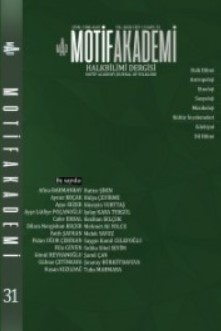ALGISAL YAPIDAN KAVRAMSAL SEMBOLİK YAPIYA GEÇİŞ SÜRECİNDE EFSANELERDE GELENEKSEL DENEYİM BİLGİSİ
TRADITIONAL EXPERIENCE KNOWLEDGE IN LEGENDS IN THE PROCESS OF TRANSITION FROM PERCEPTUAL TO CONCEPTUAL SYMBOLIC STRUCTURE
Author(s): Gülnaz ÇETİNKAYASubject(s): Cultural history, Oral history
Published by: Motif Halk Oyunları Eğitim ve Öğretim Vakfı
Keywords: Perception; concept; legend; cultural memory; nature; tradition; experience;
Summary/Abstract: Legends, one of the narratives shaped by the traditional memory of experience of centuries, is one of the oral cultural creations in which the relationship between object-human and space is conveyed through cultural interpretations. In these oral cultural creations, the traditional knowledge, which is formed as a result of interaction with nature and transferred for centuries, describes and maintains the codes of survival in the harsh conditions of the geography and the survival of moral attitudes and behaviors based on social values. In the legends that convey cultural codes based on centuries, perception-based observations and information are the basis of the multi-dimensional conceptual symbolic expression of nature, space, object and human relations. The effort of the individual to make sense of the world he / she lives in is firstly the event, object, situation and so on. It starts with the perception. Each perceived element creates awareness in individual memories, and these elements that create awareness later become a concept by combining with the acceptances and values of social memory. Every information that turns into a concept supports its content with different symbolic elements and these symbolic texts are transferred to future generations through language. The most important tools of this transmission are oral culture products. The information conveyed by oral culture products constitutes the cultural, ecological, linguistic, and ontological codes of the individual leaving traces on the environment in which he lives and being affected from it. It is the experiences of the individual that shape these codes.
Journal: Motif Akademi Halkbilimi Dergisi
- Issue Year: 13/2020
- Issue No: 31
- Page Range: 1101-1117
- Page Count: 17
- Language: Turkish

